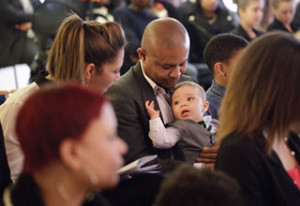 British Sign Language is Britain's fourth indigenous language, used by Deaf and hearing members of the Deaf community.
British Sign Language is Britain's fourth indigenous language, used by Deaf and hearing members of the Deaf community.
Deaf people who use British Sign Language (BSL) often go to their local Chaplain, or specialist minister for Deaf people to conduct the baptisms of their children in BSL. However, sometimes they choose to come to their parish church, or a church where they have strong connections and may need to use an interpreter for the service.
There may also be Deaf Godparents or sponsors and friends who wish to attend and they may also need to use an interpreter.
Ministers need to consider what expectations are placed on a Deaf family concerning baptism. If there is a strong encouragement to attend baptism preparation classes, or Sunday worship, then interpreters will be needed for these events in addition to the service of baptism.
Sign Language interpreters are highly trained professionals who will need to be paid for their services just like anyone else taking a professional role in the service. Deaf families requesting an interpreter should not be expected to pay for this provision since without it they will not be able to access the service.
Your diocese may have a policy for the funding of Sign Language interpreters at Occasional Offices.
You can find briefing papers to help you to use an interpreter at a service of infant baptism by following this link.
Further advice may be obtained from Rev Canon Gill Behenna, the Church of England National Deaf Ministry Adviser: gill.behenna@churchofengland.org
Frequently asked questions about BSL interpreters
How much will it cost?
This is difficult to answer because most interpreters are free-lance workers and so their fees vary. In 2011 the national average fee charged was £30 an hour but you should remember that most interpreters will have a minimum call-out fee that they will charge that equates to two or three hours
Can't some interpreters provide this for free for the Church?
Some interpreters already work for free in their local churches, Sunday by Sunday, interpreting the services. Some will reduce their fees for Church work and some will occasionally work without a fee, if the Deaf person who has died, or the Deaf people who are getting married, are known to them personally. However, it should be remembered that free-lance interpreters are highly trained interpreters who need to earn a living. They should be treated fairly. Even volunteers should have their travelling expenses met.
Our service is entirely on the screen/written in a service sheet/book so why can?t the Deaf person simply read the text?
Having written/projected material is really helpful for Deaf people. However, many people do not use English as their first or preferred language and will not be able to engage in worship simply through the written word. A BSL/English interpreter gives access to tone of voice, emotional content and, of course, all the parts of a service that are not written down.
We have someone in our congregation who has been studying sign language - why can't they do it?
They may be able to - but you need to make sure that they have learnt BSL to at least level 3 (A level equivalent) and also had some interpreter training. Weddings and funerals use very complex language and interpreters are trained to deal with such language. It would be good if the sign language user could come to the service to be around for Deaf people who may attend - even if they are not actually interpreting.
In most instances, trained interpreters, registered with the National Register of Communication Professionals with Deaf and Deafblind People (NRCPD) should be used.
We have a local Chaplain for the Deaf. Can they do it?
As above, they may be able to do it. However, some of the Chaplains do not have the required skill level and some of the Chaplains are Deaf themselves so may not be able to interpret. You should ask for their advice because even if they are not able to interpret, they will be able to put you in touch with an interpreter.
A Deaf person wants to do a Bible reading in the service. How would that work?
Easily, the interpreters work between two languages: English and BSL, so if something is presented in BSL, it can be interpreted into spoken English for the benefit of the members of the congregation who do not sign.
Where can I find an interpreter?
NRCPD
The Association of Sign Language Interpreters
Both these organisations have databases that are searchable by regions or postcodes.
Signs of God www.signsofgod.org.uk has a searchable database of Christian interpreters that are familiar with Church services. They are also happy to send interpreting requests to their members.
Header Text
Footer Text
- Tags
- ALL LIFE EVENTS Accessibility
- ALL LIFE EVENTS Conferences and webinars
- ALL LIFE EVENTS Encouragement
- ALL LIFE EVENTS Faith journeys
- ALL LIFE EVENTS Follow up
- ALL LIFE EVENTS Free editorial and articles
- ALL LIFE EVENTS Gifts
- ALL LIFE EVENTS Impact
- ALL LIFE EVENTS Keeping in touch
- ALL LIFE EVENTS Life Events in the media
- ALL LIFE EVENTS Liturgical
- ALL LIFE EVENTS Publicity and invitation
- ALL LIFE EVENTS Reflecting on Ministry
- ALL LIFE EVENTS Research
- ALL LIFE EVENTS Resources
- ALL LIFE EVENTS Seasons
- ALL LIFE EVENTS The Bible
- ALL LIFE EVENTS Welcome
- BAPTISMS
- BAPTISMS Activities for families
- BAPTISMS Godparents
- BAPTISMS Service and ceremony ideas
- EVERYDAY CHURCH Faith at Home






